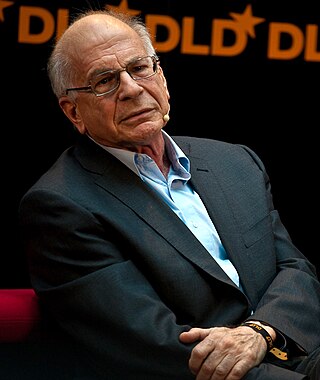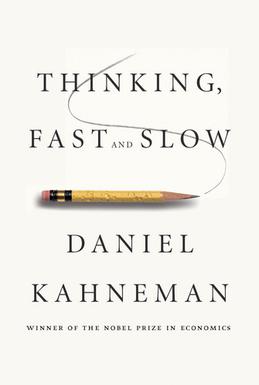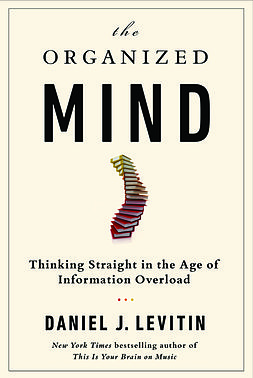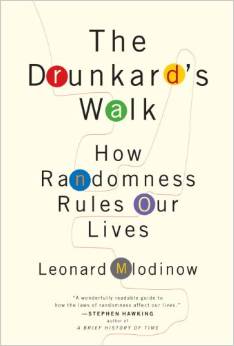
Daniel Kahneman is an Israeli-American psychologist and economist notable for his work on the psychology of judgment and decision-making, as well as behavioral economics, for which he was awarded the 2002 Nobel Memorial Prize in Economic Sciences. His empirical findings challenge the assumption of human rationality prevailing in modern economic theory.
Critical thinking is the analysis of available facts, evidence, observations, and arguments in order to form a judgment by the application of rational, skeptical, and unbiased analyses and evaluation. The application of critical thinking include self-directed, self-disciplined, self-monitored, and self-corrective habits of mind, thus, a critical thinker is a person who practices the skills of critical thinking or has been trained and educated in its disciplines. Richard W. Paul said that the mind of a critical thinker engages the person's intellectual abilities and personality traits. Critical thinking presupposes assent to rigorous standards of excellence and mindful command of their use in effective communication and problem-solving, and a commitment to overcome egocentrism and sociocentrism.
Decision theory is a branch of applied probability theory and analytic philosophy concerned with the theory of making decisions based on assigning probabilities to various factors and assigning numerical consequences to the outcome.
Fact-checking is the process of verifying the factual accuracy of questioned reporting and statements. Fact-checking can be conducted before or after the text or content is published or otherwise disseminated. Internal fact-checking is such checking done in-house by the publisher to prevent inaccurate content from being published; when the text is analyzed by a third party, the process is called external fact-checking.

Logical reasoning is a mental activity that aims to arrive at a conclusion in a rigorous manner. It happens in the form of inferences or arguments by starting from a set of premises and reasoning to a conclusion supported by these premises. The premises and the conclusion are propositions, i.e. true or false claims about what is the case. Together, they form an argument. Logical reasoning is norm-governed in the sense that it aims to formulate correct arguments that any rational person would find convincing. The main discipline studying logical reasoning is called logic.
Apophenia is the tendency to perceive meaningful connections between unrelated things. The term was coined by psychiatrist Klaus Conrad in his 1958 publication on the beginning stages of schizophrenia. He defined it as "unmotivated seeing of connections [accompanied by] a specific feeling of abnormal meaningfulness". He described the early stages of delusional thought as self-referential over-interpretations of actual sensory perceptions, as opposed to hallucinations.
Misinformation is incorrect or misleading information. It differs from disinformation, which is deliberately deceptive. Rumors are information not attributed to any particular source, and so are unreliable and often unverified, but can turn out to be either true or false. Even if later retracted, misinformation can continue to influence actions and memory. People may be more prone to believe misinformation because they are emotionally connected to what they are listening to or are reading. The role of social media has made information readily available to society at anytime, and it connects vast groups of people along with their information at one time. Advances in technology has impacted the way people communicate information and the way misinformation is spread. Misinformation has impacts on societies' ability to receive information which then influences our communities, politics, and medical field.
Source criticism is the process of evaluating an information source, i.e.: a document, a person, a speech, a fingerprint, a photo, an observation, or anything used in order to obtain knowledge. In relation to a given purpose, a given information source may be more or less valid, reliable or relevant. Broadly, "source criticism" is the interdisciplinary study of how information sources are evaluated for given tasks.

Daniel Joseph Levitin, FRSC is an American-Canadian cognitive psychologist, neuroscientist, writer, musician, and record producer. He is the author of four New York Times best-selling books, including This Is Your Brain on Music: The Science of a Human Obsession, which has sold more than 1 million copies.
Statistical literacy is the ability to understand and reason with statistics and data. The abilities to understand and reason with data, or arguments that use data, are necessary for citizens to understand material presented in publications such as newspapers, television, and the Internet. However, scientists also need to develop statistical literacy so that they can both produce rigorous and reproducible research and consume it. Numeracy is an element of being statistically literate and in some models of statistical literacy, or for some populations, it is a prerequisite skill. Being statistically literate is sometimes taken to include having the abilities to both critically evaluate statistical material and appreciate the relevance of statistically-based approaches to all aspects of life in general or to the evaluating, design, and/or production of scientific work.

Nudge: Improving Decisions about Health, Wealth, and Happiness is a book written by University of Chicago economist and Nobel Laureate Richard H. Thaler and Harvard Law School Professor Cass R. Sunstein, first published in 2008. In 2021, a revised edition was released, subtitled The Final Edition.
The National Business Book Award is an award presented to Canadian business authors. The award, presented every year since 1985, is sponsored by Bennett Jones, The Globe and Mail, and The Walrus, DeGroote, and supported by CPA Canada and with prize management by Freedman & Associates.

Thinking, Fast and Slow is a 2011 book by psychologist Daniel Kahneman. The book's main thesis is a differentiation between two modes of thought: "System 1" is fast, instinctive and emotional; "System 2" is slower, more deliberative, and more logical.

The Organized Mind: Thinking Straight in the Age of Information Overload is a bestselling popular science book written by the McGill University neuroscientist Daniel J. Levitin, PhD, and first published by Dutton Penguin in the United States and Canada in 2014. It is Levitin's 3rd consecutive best-seller, debuting at #2 on the New York Times Best Seller List, #1 on the Canadian best-seller lists, #1 on Amazon, and #5 on The London Times bestseller list.

The Drunkard's Walk: How Randomness Rules Our Lives is a 2008 popular science book by American physicist and author Leonard Mlodinow, which became a New York Times bestseller and a New York Times notable book.

Timothy Allen Caulfield is a Canadian professor of law at the University of Alberta, the research director of its Health Law Institute, and current Canada Research Chair in Health Law and Policy. He specializes in legal, policy and ethical issues in medical research and its commercialization. In addition to professional publications, he is the author of several books aimed at the general reader and host of a television documentary series debunking pseudoscientific myths. He is a fellow of the Committee for Skeptical Inquiry and the Pierre Elliott Trudeau Foundation.
Post-truth politics is a political culture in which the distinction between truth and falsity—as well as honesty and lying—have become a focal concern of public life, and are viewed by popular commentators and academic researchers alike as having a determinate role in how politics operates at particular points in history. It is regarded as especially being influenced by the arrival of new communication and media technologies. Popularized as a term in news media and a dictionary definition, post-truth has developed from a short-hand label for the abundance and influence of misleading or false political claims into a concept empirically studied and theorized by academic research. Oxford Dictionaries declared that its international word of the year in 2016 was "post-truth", citing a 20-fold increase in usage compared to 2015, and noted that it was commonly associated with the noun "post-truth politics".

Fake news is false or misleading information presented as news. Fake news often has the aim of damaging the reputation of a person or entity, or making money through advertising revenue. Although false news has always been spread throughout history, the term "fake news" was first used in the 1890s when sensational reports in newspapers were common. Nevertheless, the term does not have a fixed definition and has been applied broadly to any type of false information. It's also been used by high-profile people to apply to any news unfavourable to them. Further, disinformation involves spreading false information with harmful intent and is sometimes generated and propagated by hostile foreign actors, particularly during elections. In some definitions, fake news includes satirical articles misinterpreted as genuine, and articles that employ sensationalist or clickbait headlines that are not supported in the text. Because of this diversity of types of false news, researchers are beginning to favour information disorder as a more neutral and informative term.
Daniel Dale is a Canadian journalist known for rebutting a large number of claims made by United States President Donald Trump during his 2016 presidential campaign and presidency. Dale credits an encounter with Toronto Mayor Rob Ford while covering the mayor and his brother Doug for the Toronto Star as the inspiration for developing his brand of adversarial journalism.

White Fragility: Why It's So Hard for White People to Talk About Racism is a 2018 book written by Robin DiAngelo about race relations in the United States. An academic with experience in diversity training, DiAngelo coined the term "white fragility" in 2011 to describe any defensive instincts or reactions that a white person experiences when questioned about race or made to consider their own race. In White Fragility, DiAngelo views racism in the United States as systemic and often perpetuated subconsciously by individuals. She recommends against viewing racism as committed intentionally by "bad people".










